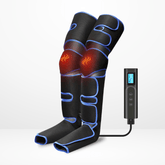How to Finally Get a Good Night's Sleep
Do you find yourself tossing and turning at night, unable to get a good night's sleep? You're not alone.
Millions of people worldwide struggle with sleep issues, but the good news is, there are steps you can take to improve your sleep quality and finally get the rest you need.
In this comprehensive guide, we'll explore some of the best strategies for achieving a good night's sleep and waking up feeling refreshed and rejuvenated.

Common Sleep Problems:
1. Insomnia:
Insomnia is a common sleep disorder characterized by difficulty falling asleep, staying asleep, or both. It can be caused by stress, anxiety, depression, medical conditions, or certain medications.2. Sleep Apnea:
Sleep apnea is a serious sleep disorder that occurs when a person's breathing is interrupted during sleep. It can lead to snoring, gasping for air during sleep, and daytime fatigue.3. Restless Leg Syndrome (RLS):
Restless leg syndrome is a neurological disorder characterized by an uncontrollable urge to move the legs, especially at night. It can disrupt sleep and lead to daytime fatigue and irritability.4. Narcolepsy:
Narcolepsy is a chronic sleep disorder characterized by overwhelming daytime drowsiness and sudden attacks of sleep. It can interfere with daily activities and increase the risk of accidents.Strategies for Better Sleep:
1. Establish a Bedtime Routine:
Create a relaxing bedtime routine to signal to your body that it's time to wind down. This could include activities such as reading, taking a warm bath, or practicing relaxation techniques like deep breathing or meditation.
2. Maintain a Consistent Sleep Schedule:
Go to bed and wake up at the same time every day, even on weekends. Consistency helps regulate your body's internal clock and can improve the quality of your sleep.
3. Create a Comfortable Sleep Environment:
Make sure your bedroom is conducive to sleep by keeping it cool, dark, and quiet. Invest in a comfortable mattress and pillows, and consider using blackout curtains or white noise machines to block out distractions.
Too much light in your bedroom? Try this amazing memory foam sleeping mask:
- 3D Memory Foam Sleeping Mask - Adjustable Light Blocking Mask For Side Sleepers
4. Limit Screen Time Before Bed:
Avoid using electronic devices such as smartphones, tablets, and computers for at least an hour before bedtime. The blue light emitted by these devices can interfere with the production of melatonin, a hormone that regulates sleep.5. Watch What You Eat and Drink:
Avoid heavy meals, caffeine, and alcohol close to bedtime, as they can disrupt sleep. Instead, opt for light snacks and non-caffeinated beverages in the evening.6. Get Regular Exercise:
Engage in regular physical activity during the day, but avoid vigorous exercise close to bedtime, as it can stimulate your body and make it harder to fall asleep.
If you struggle finding your best position, this will help you :
- Butterfly Memory Foam Pillow - Orthopedic Pain Relief Shaped Pillow

- Leg Memory Foam Pillow - Multi-Position Comfort Leg Pillow For Sleep, Support & Relief
7. Manage Stress and Anxiety:
Practice stress-reducing techniques such as yoga, meditation, or deep breathing exercises to help calm your mind and prepare your body for sleep.
Do you suffer from sleeping apnea? Does your partner snore at night?
Try this amazing product:
- Anti-Snoring Tongue Retainer - Reduce Snoring And Apnea

Seeking Professional Help:
If you've tried these strategies and are still having trouble sleeping, it may be time to seek help from a healthcare professional. They can help identify any underlying sleep disorders and recommend appropriate treatment options.
Conclusion:
Getting a good night's sleep is essential for your overall health and well-being. By implementing these strategies and making sleep a priority, you can improve your sleep quality and wake up feeling refreshed and rejuvenated each morning.
For more tips on improving sleep quality and related products, visit this page for a wide range of sleep aids, pillows, and bedding solutions.



















